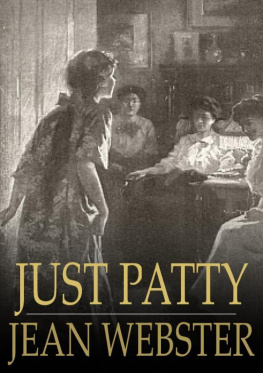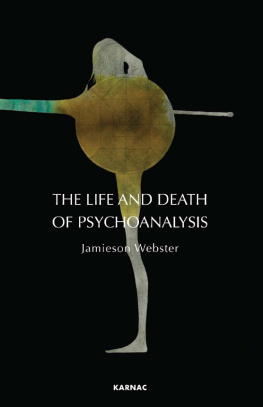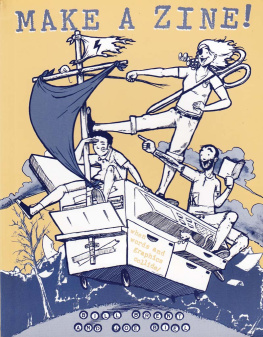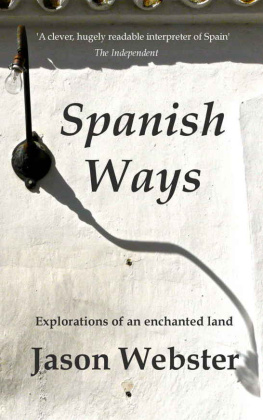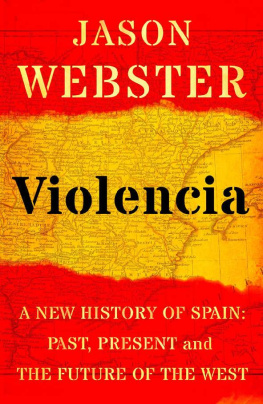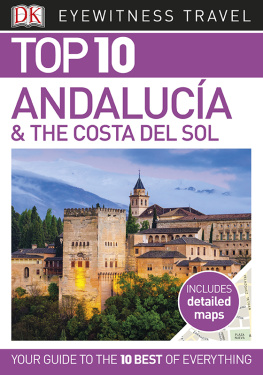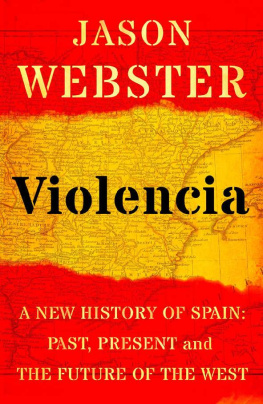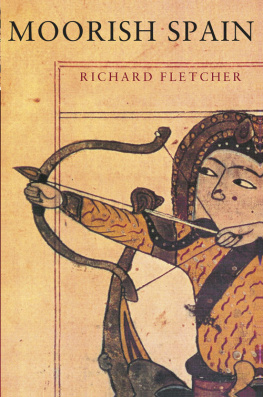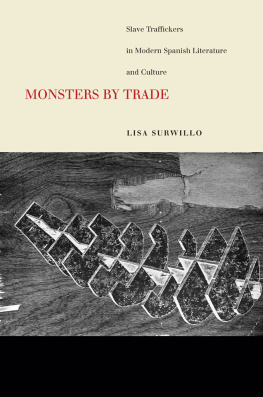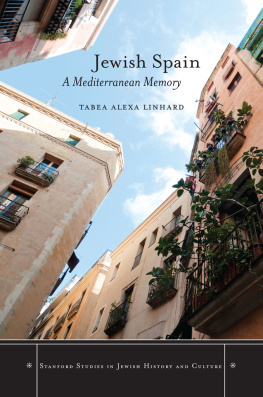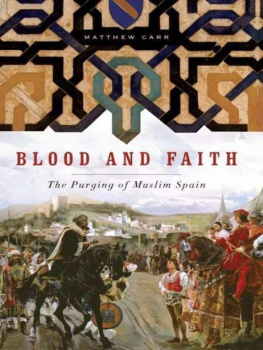Andalus
Unlocking the Secrets of Moorish Spain
Jason Webster

This eBook is copyright material and must not be copied, reproduced, transferred, distributed, leased, licensed or publicly performed or used in any way except as specifically permitted in writing by the publishers, as allowed under the terms and conditions under which it was purchased or as strictly permitted by applicable copyright law. Any unauthorised distribution or use of this text may be a direct infringement of the authors and publishers rights and those responsible may be liable in law accordingly.
Version 1.0
Epub ISBN 9781407094816
www.randomhouse.co.uk
TRANSWORLD PUBLISHERS
6163 Uxbridge Road, London W5 5SA
a division of The Random House Group Ltd
RANDOM HOUSE AUSTRALIA (PTY) LTD
20 Alfred Street, Milsons Point, Sydney,
New South Wales 2061, Australia
RANDOM HOUSE NEW ZEALAND LTD
18 Poland Road, Glenfield, Auckland 10, New Zealand
RANDOM HOUSE SOUTH AFRICA (PTY) LTD
Endulini, 5a Jubilee Road, Parktown 2193, South Africa
Published 2004 by Doubleday
a division of Transworld Publishers
Copyright Jason Webster 2004
The right of Jason Webster to be identified as the author of this work has been asserted in accordance with sections 77 and 78 of the Copyright, Designs and Patents Act 1988.
All the characters in this book are fictitious, and any resemblance to actual persons, living or dead, is purely coincidental.
A catalogue record for this book is available from the British Library. ISBNs 0385 605072 (cased) 0385 607717 (tpb)
All rights reserved. No part of this publication may be reproduced, stored in a retrieval system, or transmitted in any form or by any means, electronic, mechanical, photocopying, recording or otherwise, without the prior permission of the publishers.
Typeset in 12/14pt Bulmer by Falcon Oast Graphic Art Ltd.
Printed in Great Britain by Clays Ltd, St Ives plc
1 3 5 7 9 10 8 6 4 2
Papers used by Transworld Publishers are natural, recyclable products made from wood grown in sustainable forests. The manufacturing processes conform to the environmental regulations of the country of origin.
CONTENTS
For Pepe, Zine el Abedine B. and Luca F. S.

Jason Webster was born in San Francisco in 1970 and
grew up in England and Germany. After studying Arabic at
Oxford and living for several years in Italy and Egypt, he went
to Spain to learn to play the flamenco guitar. He currently
lives in Valencia with his Spanish wife. He is the author of
the critically acclaimed Duende.
Duende: A Journey in Search of Flamenco
A compelling account of a culture closed to most
guiris (foreigners) and infinitely darker and more dramatic
than the colourful tourist spectacles would have
them believe a page-turner.
Observer
Unputdownable. The autobiography-as-travelogue that is also
a rite of passage is a form which worked brilliantly for Laurie
Lee and Bruce Chatwin Ladies and gentlemen, we have
a new star of the genre: Jason Webster.
Daily Mail
A fascinating book, the most gripping I have read for years
Jason Webster is an exceptional writer, and this is a great book.
Guardian
An impressive dbut passionate and evocative.
Sunday Times
Outstanding dbut the most authentic and compelling
account of flamenco in English, and one of the best books ever
written about Spain.
Literary Review
By the same author
Duende: A Journey in Search of Flamenco
ACKNOWLEDGEMENTS
I would like to thank the following people for their help with this book:
Jos and Maribel Valdivia; Emilio Galindo; Dr Robin Ostle; Alan Jones; Dr Jeremy Johns; Jessica Hallett; Conceiao Amaral; Beln DSouza; Santiago Macias; Fernando Tuvilla; Esther Lieft; HRH Prince Jos-Mara de Almuzara y Navarro; Miles Roddis; Juan Ferzerode; Muhammad Lpez; Faelo; Amadeo Garca; Sayed Arash and Hazel Debestani; Shaykh Ziyendi; Salma Grimwood; Kifah Arif; Oriental Institute, University of Oxford.
My agent, Natasha Fairweather, has been a constant support, patiently putting up with my crazier ideas until the right one came along. Emma Parry in New York also gave very useful advice at the start. Everyone at Transworld has been superb, particularly Marianne Velmans, Diana Beaumont and Kate Samano. Very special thanks go to my editor Sarah Westcott for her invaluable contribution.
And, of course, to Salud. Con todo mi amor.

Spain, first civilised by the Phoenicians and long possessed
by the Moors, has indelibly retained the original impressions.
Test her, therefore, and her natives by an Oriental standard.
Richard Ford, A Handbook for Travellers in Spain
Travel, and you will see the meaning of things.
Moroccan proverb

THE FARM
I f they catch you they will break your legs. You must leave at once.
The old man looked away and moved as if to return to work. His thin dark skin glistened under a fur of grey whiskers and his purple lips were cracked and bloody from where he bit them and licked the scab with a circular motion of his tongue. His hands, bloated and hard, were stained pink from the endless fruit he had picked over the course of the season. How many dozens of oranges, strawberries, nisperos and lemons Id eaten had been plucked by this man, I wondered.
The heat under the sheeting was tremendous. We were in a tunnelled underworld stretching for acres over the landscape: a gigantic flat greenhouse made of plastic designed to produce fruit at all times of the year. It was the only way to make things grow in this area a toe-grip of the Sahara in Europe. This part of Spain was dry, but conditions, they said, were worsening. One day not even the plastic and the artificial conditions would be able to prevent it from becoming real desert. In the meantime the farmers were determined to extract everything they could from the soil using cheap immigrant labour.
I had only been under the plastic for twenty minutes and I was already feeling faint at an extremely humid thirty-nine degrees it felt as though there was barely enough air passing into my lungs to keep me alive. The light, steady and blinding, seemed to radiate from every surface, while the smell of labouring bodies blended with the sharp sweet scent of the fruit, producing a sickly, sweaty cocktail. But these men, of all ages, from youngsters in their late teens to the old Moroccan in front of me, worked nine, ten hours a day like this. And the little pay they got if they got any at all depended on how many boxes they could pack. Some could do as many as eighty-five or ninety in a day. But they were usually the lucky ones people treated well and given proper contracts, with perhaps even a home to go to Russians or Eastern Europeans. These men, all Moroccans, were less fortunate.



